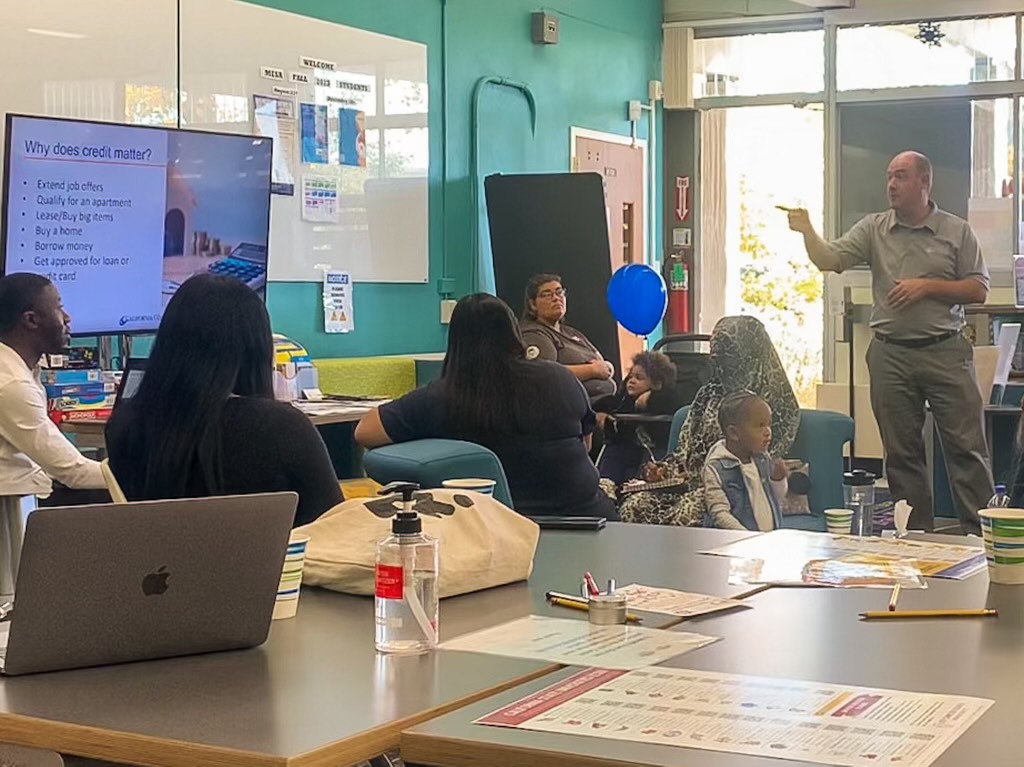San Diego Mesa College hosted the financial literacy series event, the discussion was all about credit, occurred on Dec.13 providing valuable insights into responsible credit usage and strategies to boost financial prospects. The speaker of the event was Jevon Boyer.
Boyer is California Coast Credit Union’s newest financial coach. Boyer has over 20 years of experience in the financial industry. He has been an integral part of Cal Coast since May 2017, initially serving as the Assistant Manager at the Escondido Branch. Before joining Cal Coast, Boyer held the role of Branch Manager at a local bank.
The topic of Boyer’s speech was the significance of credit scores and how they are calculated. He explained that “a credit score is a numerical representation of an individual’s creditworthiness, derived from their credit history and financial behavior,” and went on to cite various areas where a person’s credit score can be important. Boyer underscored how a robust understanding of credit scores is integral to navigating various financial aspects, empowering individuals to make informed decisions and build a solid financial foundation
A positive credit history is greatly advantageous for job seekers, as some employers examine applicants’ credit scores during their hiring process. When vetting potential renters, landlords and property managers rely on credit scores to assess a tenant’s reliability. Boyer also highlighted that a favorable credit score plays a crucial role when making significant purchases, such as appliances or furniture, impacting the leasing or buying process. Additionally, lenders use credit scores to evaluate an individual’s financial responsibility when applying for loans or credit cards.
One of the students attending the event asked Boyer what qualifies as a good credit score. Boyer responded by saying that “lenders typically consider individuals with credit scores of 670 and above as acceptable or lower-risk borrowers.” On the other hand, “those with credit scores ranging from 580 to 669 are often categorized as subprime borrowers.”
For effective methods of building credit, Boyer recommended several strategies. Namely, credit card users need to consistently pay bills on time each month, ensuring that credit card usage remains below 30% of the credit limit. However, one should utilize open credit cards at least once every six months, refraining from closing their oldest credit cards. More broadly, Boyer stressed the importance of spending less than one earns, so as never to be in debt. This holistic approach, as outlined by Boyer, serves as a foundation for responsible credit management and overall financial well-being.
For individuals seeking information about their federal credit report, there are three major credit reporting agencies that exist in the United States: Equifax, Experian, or TransUnion. The three companies jointly run AnnualCreditReport.com which is officially authorized and mandated by the federal government, and allows a person to obtain free annual credit reports from each agency every 12 months. The importance of regularly reviewing these reports for accuracy verification and credit health monitoring was heavily emphasized.
Boyer also spoke about the Fair Isaac Corporation (FICO), a data analytics company renowned for its widely used credit scoring models and mathematical algorithms that evaluate credit history to produce a numerical credit score. “The scoring model is used by 90-95% of the largest financial institutions in the United States.”
In the FICO scoring system, payment history constitutes 35% of the score, and is the single most influential element, reflecting an individual’s track record of timely payments.
Amount owed, represents 30% of the score, and reflects the current debt owed by a credit card owner, including credit card balances, loans, and debts.
Length of credit history makes up 15%, and considers the established duration of credit accounts, with Boyer advising against closing one’s oldest card to maintain a positive credit history.
New credit accounts for 10%, denote the impact of opening such accounts and inquiries. This impact is differentiated into two categories: hard hits, which are consequential credit inquiries resulting from a complete credit report pull or a loan application, potentially affecting the individual’s credit score; and soft hits, which are inconsequential credit inquiries arising from informational requests like pre-approval checks, with no impact on the individual’s credit score.
The remaining 10% is broadly defined as “other factors” encompassing various aspects like credit types used, overall credit mix, and the presence of any public records such as bankruptcies. Throughout the presentation, Boyer underscored the nuanced dynamics of each factor in shaping an individual’s FICO score.
Lenders may have their own proprietary scoring models with unique considerations different from the FICO model. Regularly monitoring your credit report, understanding the factors that impact your score, and practicing responsible financial habits can contribute to maintaining or improving your credit score over time.




